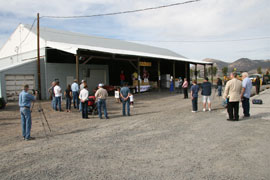
Our Klamath Basin Water Crisis
Upholding rural Americans' rights to grow food,
own property, and caretake our wildlife and natural resources.

Our Klamath Basin
Water Crisis
Upholding rural Americans' rights to grow food,
own property, and caretake our wildlife and natural resources.
 Pro
KBRA people held rally at Potato Festival Pro
KBRA people held rally at Potato FestivalMore than 20 people attended event (in addition to media and speakers and children) by KBC 10/16/10 A few blocks from the Potato Festival, a few tribal members and farmers and a Klamath County Commissioner held a rally to gain support for the KBRA/Klamath Basin Restoration Agreement. Speakers were Steve Kandra, Merrill farmer and Klamath Water Users Association Board member, Cheri Unruh, Malin farmer, Dr. Karl Wenner, Klamath Tribe Vice Chairman Don Gentry, and Klamath County Commissioner Cheryl Hukill, Cheri Unruh has a deed of trust from her grandfather's farm. She said she believes that, with the KBRA, her farm family of 7 generations will have a chance of continuing to farm, where without the KBRA they won't. Dr. Karl Wenner supports KBRA and said the KBRA leaders are "heros," and the KBRA is "fair." He said there was a spike in the 2001 water shutoff of suicides, alcoholism, stress and health issues. He believes the KBRA will bring a healthy community. Don Gentry said the KBRA is an answer to prayers, and that the KBRA supports loving one's neighbors as oneself. He said it upsets him when people say it was behind closed doors, but "there was never any intention of keeping this secret from the public" and "now the public has the opportunity to decide." He said he feels "the restoration agreement is of the people, by the people, and for the people of the Klamath Basin." Kandra was involved in planning the KBRA document. He said, "It would seem foolish to me, even if you were for or against (the KBRA), that you would even consider not having your local elected officials sitting at the table representing your interests." He was referring to the ballot issue 18-80 that asks the public, for the first time, whether they want their county to be at the KBRA negotiation table. Commissioner Cheryl Hukill said 26 stakeholders worked together to create the agreement. "This is a modern day covenant." She said those opposing the KBRA just want the status quo. She said our constitution said that every person has the right to be represented. She said the commissioners are here to represent every person. She said the KBRA is a beginning and much will be changed; the KBRA will not look the same when it is done. Cheryl said an opponent came in her office that had no plan. She said the commissioners must be at that negotiation table; "How dare we be asked to stay away from that table!" She complimented the Herald and News for representing this issue. Hukill said off Project farmer Tom Mallams and Oregon Senator Doug Whitsett, both KBRA opponents, have stated they have had beneficial closed door meetings. She believes there is no difference from their closed door meetings and those of the people who created the KBRA; she feels it's justified that the KBRA was borne behind closed doors for several years with no public input, then later the public was allowed to see their plan. Despite the fact that only 11% of her constituents in a poll showed support of the secretly negotiated plan, she said, "I'm proud of we're gunna see 'no' on KBRA" win at this election." The way the commissioners had the ballot written, a No vote means Yes, the commissioners would stay at the negotiation table. Kandra concluded the rally saying, "I'm looking forward to the day when we can catch that salmon at Keno." Sidenote: The KBRA is an agreement among the 26 environmental groups, government agencies, tribes and some farm leaders, devised with with no input or vote from the public. Their document changes the purpose to the Klamath Project from agriculture to fish and wildlife, it demands agriculture to be downsized, gives the Fish and Wildlife Service a new water right, demands destruction of 4 hydroelectric dams that supply 70,000 households annually with power andprovide flood protection and irrigation water for Siskiyou County residents, supports the Endangered Species Act and Biological Opinions (which shut down the Klamath Project in 2001, and 1/2 the Project in 2010), it supports a no-consensus group devising a drought plan to be completed after the November election (and vote), it does not specify what the promised affordable power rate will be (which will be decided later by the Department of the Interior), and it supports taking another 30,000 acre feet of water away from the off project lands even after 100,000 acre feet have been taken from them. It supports global warming studies which may change the water allocations based on the results of their studies. It gives 92,000 acres of land to the Klamath Tribes that they previously sold. It denied many agricultural stakeholders a seat at the table.
|
Page Updated: Sunday October 17, 2010 02:33 AM Pacific
Copyright © klamathbasincrisis.org, 2010, All Rights Reserved